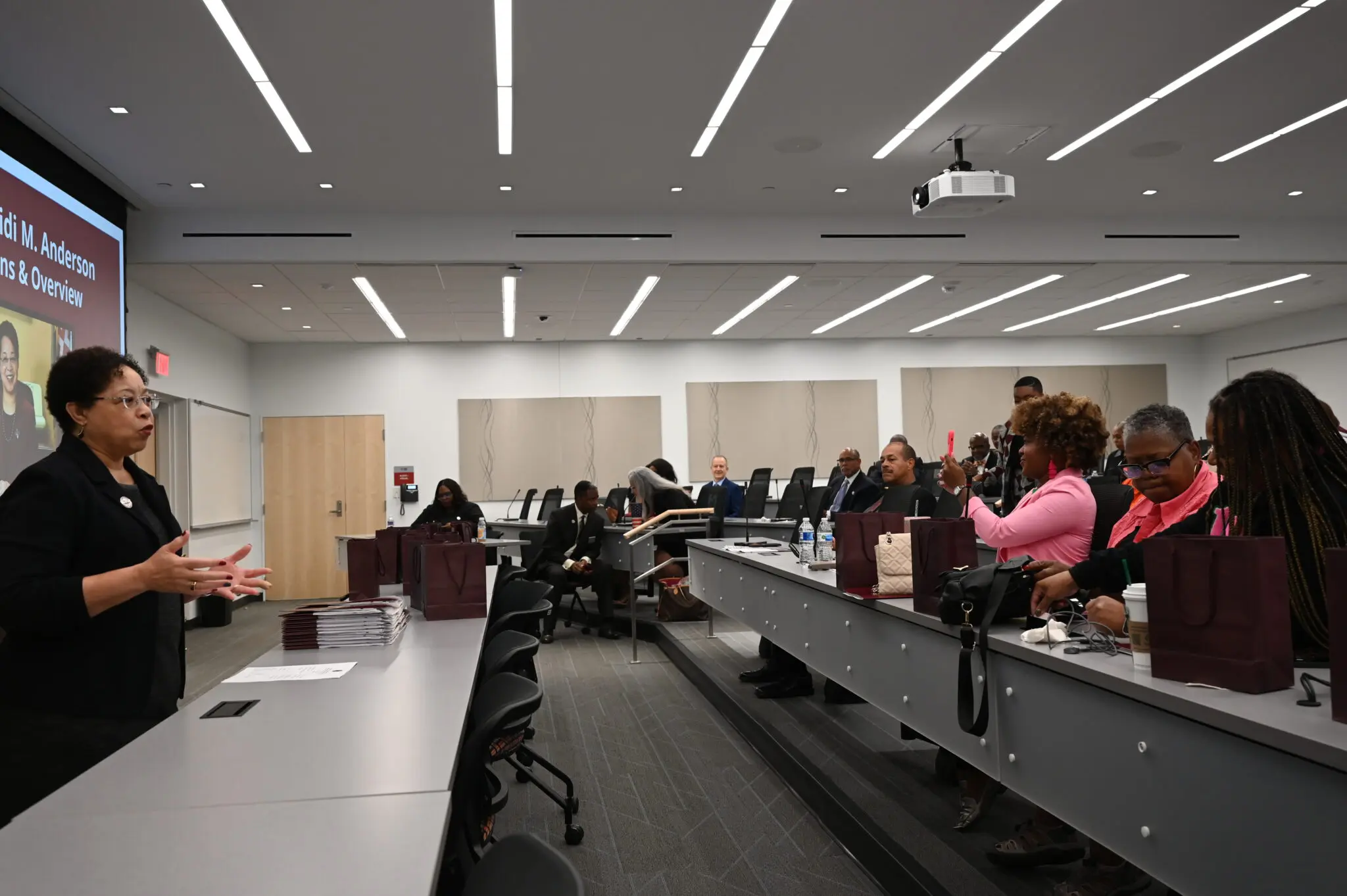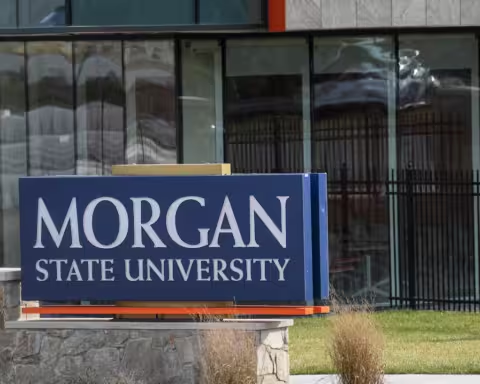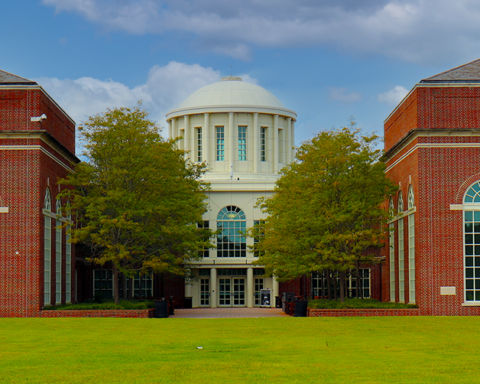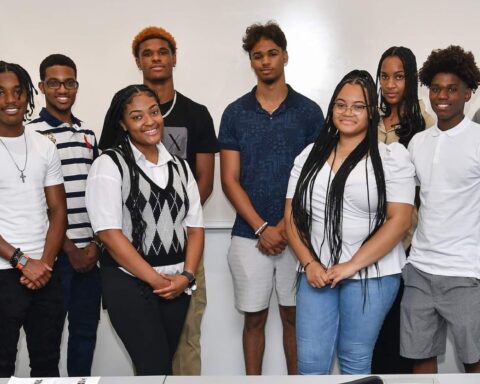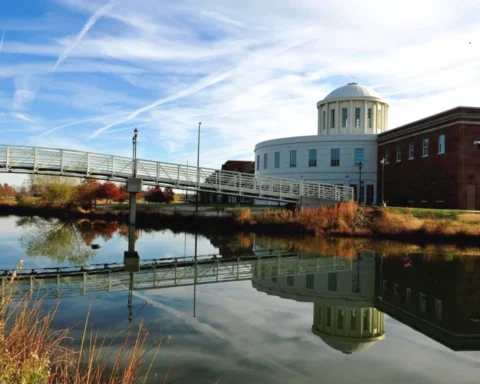Courtesy of University of Maryland Eastern Shore
The University of Maryland Eastern Shore played host to members of the Legislative Black Caucus of Maryland as part of an informational session to share some of the recent progress and successes on campus.
In welcoming the legislators, UMES president Heidi M. Anderson praised the members for their support for many pro-UMES initiatives over the years, including the completion and opening of the new School of Pharmacy & Health Professions Building, where the meeting took place.
“We wanted to show you this building for a reason,” Anderson said. “This is the new building that you helped us build through the pandemic. For that, I say thank you from the bottom of my heart and from all of the campus.”
During the meeting, members of the caucus received information on projects including the veterinary sciences doctoral program, research initiatives, and some of the challenges UMES faces ranging from campus infrastructure needs to concerns over program duplication around the state.
Dr. Moses Kairo, Dean of the School of Agriculture and Natural Sciences, shared with lawmakers the plan for the creation of the doctoral program, expected to accept its first students in the fall of 2026, and would be the second of its type at an HBCU nationally.
“Looking at labor statistics in terms of demand, we are looking at a 19-percent projected growth in the field over the next seven years,” Kairo said. “Black veterinarians make up only two percent of the working population in this country, so there’s been a tremendous need to diversify the profession. I think that when it comes to this new program, the time could not be more right.”
The new program will be an accelerated three-year program, allowing students to enter into practice earlier by compressing the academic year. It’s the same volume of work in 25 percent less time and compares favorably with schools with four-year programs. Kairo said the “innovative approach” will allow students to learn the critical components found in those same curriculums.
“We’re not compromising anything,” he said. “Our goal is to use student time more effectively and be able to graduate students one year earlier.”
Dr. Rondall Allen, Provost and Vice President for Academic Affairs discussed the recent initiatives in the School of Pharmacy & Health Professions, which features the most health professions among HBCUs in the country.
He also stressed how the programs not only impact the local community on the Eastern Shore but also communities throughout the state. He highlighted the importance of centralizing all of the health majors in one location on campus as well as offering housing to the veterinary medicine program. All of those would be accomplished through the construction of the second phase of the pharmacy building complex.
“You’re sitting in our newest and shiniest building on campus,” he said. “This building was a key step in realizing the full potential of all of our programs, but there’s a key step needed in staying viable and relevant in this everchanging world of health care.”
Dr. Michael Rabel, the professor and chair of the Department of Physical Therapy, and Dr. Tiffany Maxwell, the program director and department chair of the Physician Assistant program, presented their recent successes in their respective academic curriculums, as well as concerns about the establishment of several duplicate programs around the state.
Maxwell, who oversaw the graduation of the first cohort of the program’s PA students last fall, hopes that the legislators can continue to offer the needed support to ensure that duplicative programs don’t emerge elsewhere in the State.
“We are at full enrollment and max capacity in our program,” she said. “We have students who are knocking down the door to get into our program. I just want to make sure that we have places and seats for them.”
Dr. LaKeisha Harris, the dean of the School of Graduate Studies, addressed the university’s progress to increase its Carnegie Research classification, from its current status as an R2 — high research activity doctoral university to an R1 Doctoral University with very high research activity. Currently, there are no HBCUs with an R1 designation.
“We want to be able to look for new opportunities for students and we want to recruit and retain the best faculty,” Harris said. “There are 146 institutions that are classified R1, so not only do we want to achieve this classification, but we want to keep it and the retention of faculty and staff is the biggest part of that.”
President Anderson stressed that through the support of the Legislative Black Caucus of Maryland, UMES will not only help the many students who call the state home but will lead to wide-reaching benefits.
“We educate the best and the brightest, and it is our mission to enable them to soar in the communities that they serve,” she said. “Not only will their success provide a major economic impact to the communities in Maryland, but also to the country, and to the world. And with your help, that’s what we will continue to do.”
After a round of pictures and fellowship with Pharmacy students in the atrium, the Caucus and UMES leadership were off to Crisfield for the Tawes Crab and Clam Bake—a memorable day for UMES and its supporters.

